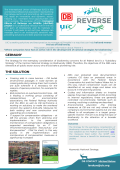This case study investigates winegrowers’ motives and barriers to convert to organic farming practices in the largest wine regions in Germany, Pfalz and Rheinhessen. The authors compare interview results with literature from throughout the European Union, and analyze their findings using the five capitals framework to assess livelihood strategies.
The results indicate that the motives for organic farming most often identified, in both the literature and the interviews, are a pro-organic ideology of the farmer (human capital) and supportive social networks (social capital). Barriers to converting to organic farming were skeptical attitudes toward social networks (social capital) and doubting the environmental benefits of organic winegrowing, especially the use of copper (natural capital). Additional barriers identified from the interviews were a farmer’s ideology against organic farming (human capital), while the literature discussed financial risks, especially during the conversion periods (financial capital). In the particular case of organic wines in Pfalz and Rheinhessen, it was important to be able to tell a story around wines that stresses wine quality. The study, therefore, concludes that potential avenues to increase organic farming in Germany include addressing the use and environmental impacts of copper, addressing ideological barriers against organic farming, supporting the possibility to tell the story behind a wine, and increasing financial support.


